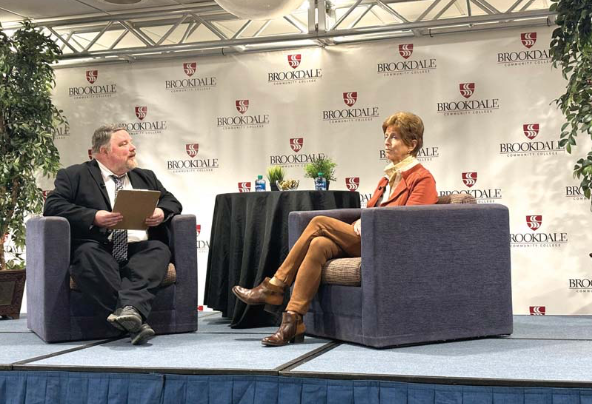
By Stephen Appezzato
LINCROFT – It’s not often the public is offered an inside glimpse into what it is like to run a state or national agency. But last week, Brookdale Community College professor of political science Jonathan Moschberger hosted Christine Todd Whitman, former New Jersey governor and Environmental Protection Agency (EPA) administrator under President George W. Bush, for a deep-dive into her career.
Whitman discussed an array of topics pertaining to the past and future, providing a unique insight into politics and leadership for curious minds.
In the Beginning
Whitman grew up in a political family, spurring an early fascination with and passion for politics. Her mother and father met at the 1933 Republican National Convention, later becoming a Republican National Committee member and Republican State chairman, respectively.
Whitman’s earliest political memories range from attending a ballot count at her local firehouse as a child to meeting President Dwight Eisenhower at the 1956 Republican Convention when he received the presidential nomination for a second time.
“At the end, after Dwight Eisenhower had given his acceptance speech, ma got me down to the stairs where he was coming down the front of the podium – nobody disappeared in the back – he came down the front,” Whitman said.
She gave Eisenhower a small golf tee holder she made at camp. The next day in the press, the former president said he was going to play golf, holding up Whitman’s gift, she recalled.
These early memories sparked a desire for Whitman to one day become a leader. In the 1970s, ’80s and ’90s, she went on to hold local-level positions and become the president of the state Board of Public Utilities. After a failed run for U.S. Senate, she continued building her political profile as a Republican, eventually running for governor.
Governorship
With the 1993 general election, Whitman became the first and still the only female governor of New Jersey. At the time, it “was the most powerful governorship in the country because of several changes that they made to the Constitution in 1947,” she recalled.
Whitman did a lot during her tenure, including balancing the state budget, making income tax cuts and focusing on welfare and pension reform. At the time, the state legislature was fully Republican but even then, she sometimes butted heads with Senate and Assembly leaders.
“I often wished that I had one House that was a Democratic House,” she said. “It’s not healthy to have everything in the hands of one party.”
Whitman said it is very difficult to accomplish anything in the last year as governor. “All the legislature cares about is who’s going to be the next governor,” she said.
Whitman served two terms, ultimately resigning in 2001 to take on her next leadership challenge.
The Environmental Protection Agency
Whitman was approached by President-Elect George W. Bush, who asked her to serve in his cabinet as administrator of the EPA.
Initially, she recalled, she didn’t want to accept the job.
“I did push back a little bit and said ‘I really think I can serve you better at the U.N. or Commerce (Department), because we’d done a lot in New Jersey” with those sectors, like job growth, she said.
But the Secretary of Commerce position “had already been promised to someone that was a good friend of the Bushes,” she said, alluding to Donald Louis Evans, “and I was pro-choice, so I was not going to go to the United Nations because they made decisions about women’s rights. And so, it was EPA.”
“It’s pretty hard to turn down a president-elect when you’re asked to serve at the national level,” she joked.
Her time leading the EPA would prove her most difficult leadership challenge yet. Less than one year into her new role, Whitman experienced the most significant political event of her life. In the aftermath of the attacks on 9/11, the EPA was called in to assist with site cleanup.
Some may remember when Whitman famously assured people that the air quality in Lower Manhattan was safe to breathe and the water safe to drink. An EPA Inspector General report from 2003 later deemed her assurance misleading, due to a lack of data and analyses. The report also found that the White House had convinced the EPA to make reassuring statements amid rising panic and that, following the attack, the National Security Council controlled EPA communications.
Whitman recalled it was an especially difficult and frustrating disaster to navigate.
“Whenever there is a major event like that, the primary responder is the city where it is located. And so, we did not have the authority to make (workers) and first responders wear respirators,” she said.
“Even though we got every respirator the agency had across the country there, they wouldn’t wear them,” she said, because respirators were “cumbersome, they were hot, it was beautiful weather. Whitman remembers pleading with first responders to wear respirators, but could not get them to do it. “They (the respirators) got clogged and they (the responders) were on a mission. I get it.”
Whitman defended her stance. “While the air quality in Lower Manhattan in general, as far as the scientists were telling me, was safe to breathe, always – every time – I always said that on the pile you had to wear a respirator,” she said.
Following the Sept. 11 attack, the EPA navigated the 2001 anthrax attacks, where letters laced with anthrax appeared in the U.S. mail, killing five and sickening 17. The EPA was responsible for cleaning up targeted buildings and developing an anthrax cleanup standard and protocol.
There were also highlights from her time leading the EPA, like moving the first environmental legislation through Congress since the 1970s and establishing an environmental report card for the country. Prior to her tenure, there were no national reports on the state of the environment, she recalled.
A sticking point then was climate change; she said the administration “just didn’t want to hear about it.” Bush administration revised her agency’s climate report to remove that section, replacing it with one paragraph that described climate change as “an emerging issue.”
Aside from that, Whitman said she and her team at the EPA were proud of their report.
However, following multiple public conflicts with the Bush administration, Whitman resigned in 2003.
Responding to a question, Whitman identified climate change, water quality and water availability as the most important environmental issues we face today.
Looking Forward
Addressing questions on the state of our democracy, Whitman said she was “worried.” “It is frail,” she said, because a lack of civic participation and the vitriol in politics has deterred many from running for office.
Both Whitman and Moschberger spoke about the importance of civics in education. “Nowadays, we barely teach it at all. I think that’s one of the roots of our problems that we’re having today,” Whitman said. Whitman said the populace has gotten “lazy about our democracy” and is taking it for granted.
She noted that many people do not vote which poses an issue for any democracy. “We can’t afford to just sit back,” she said.
“That’s why I think we’re in a perilous place right now.”
While she was anxious for our nation’s future, she also said she was hopeful.
Following her time with the EPA, Whitman became the co-chair of the Forward Party, a third-party option for voters at the local level.
The goal of the Forward Party is to create bipartisan change through a bottom-up movement. Although it has a nationwide presence, the Forward Party at this time is more concerned with local-level politics and bringing voters together for positive civil discourse. Former Democratic candidate for president Andrew Yang, as well as Lindsey Williams Drath, Michael Willner, Kerry Healey and even former Nirvana bassist Krist Novoselic are leading party members.
Through bipartisan collaboration and constructive civil discourse, Whitman believes the political system can become more productive and less polarized.
Whitman’s discussion at Brookdale Community College provided a unique insight into state and national political roles for students, instilling a sense of political responsibility and engagement for the many who attended.
Our nation’s democracy is “worth the battle,” she said.
The article originally appeared in the December 7 – December 13, 2023 print edition of The Two River Times.














